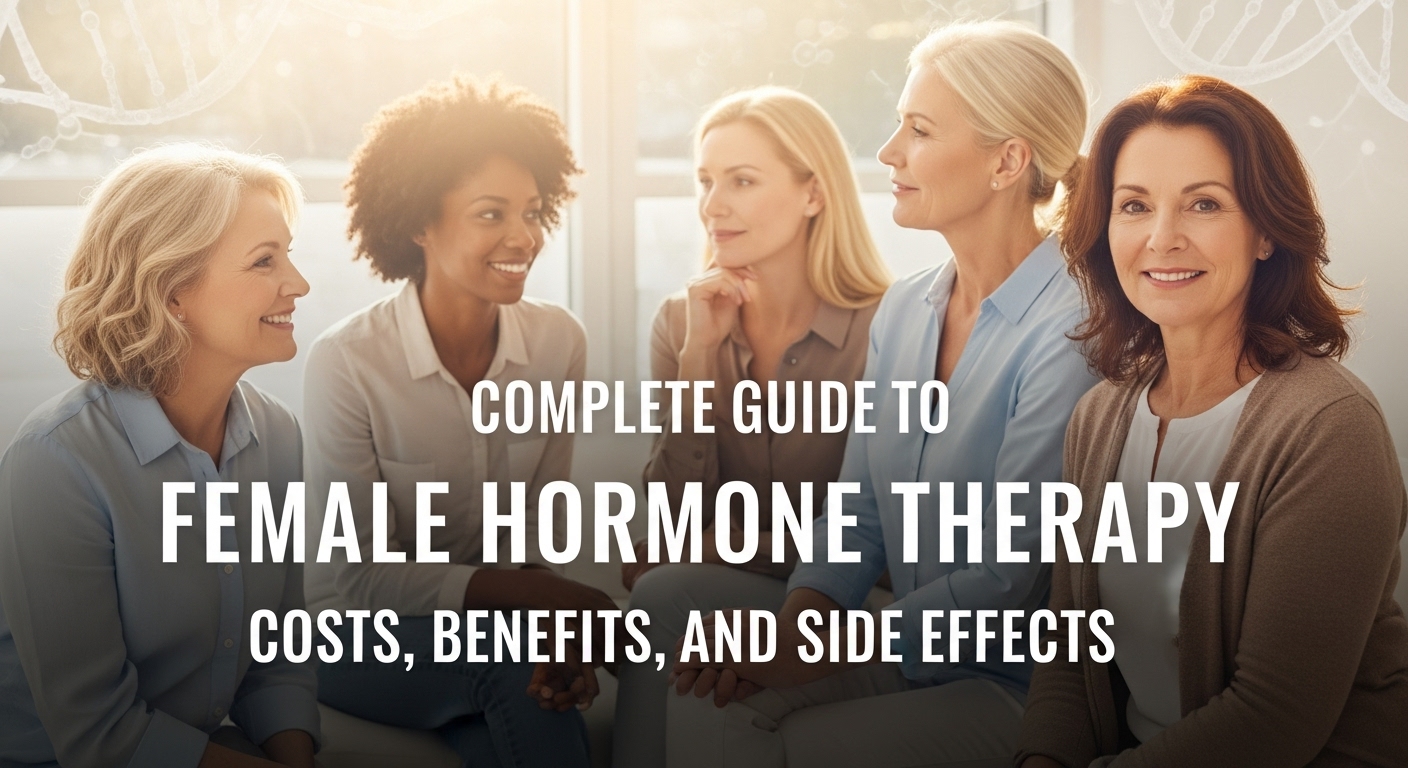As women age or experience major hormonal changes, symptoms like fatigue, mood swings, low libido, or irregular menstrual cycles can become difficult to manage. These issues often stem from hormonal imbalances, a natural part of ageing, menopause, or medical conditions. Female hormone therapy has become a trusted solution for women who want to restore hormonal balance, feel better, and maintain their quality of life.
In this comprehensive guide, we’ll cover the costs, benefits, and side effects of female hormone therapy, explore the available options, and help you understand whether it’s right for you.
What Is Female Hormone Therapy?
Female hormone therapy (FHT), often referred to as hormone replacement therapy (HRT), is a treatment designed to balance hormone levels in women. It typically involves supplementing hormones like estrogen, progesterone, and sometimes testosterone, all of which play a vital role in regulating mood, metabolism, reproductive health, and bone strength.
This therapy is commonly used to:
- Relieve menopausal symptoms such as hot flashes and night sweats
- Improve energy levels and mental clarity
- Support sexual wellness and skin health
- Prevent bone loss associated with osteoporosis
Types of Female Hormone Therapy
When it comes to restoring hormonal balance, there’s no one-size-fits-all solution. The type of hormone therapy you choose depends on your unique body chemistry and health goals.
1. Estrogen Therapy
Estrogen is the main hormone that decreases during menopause. Replacing it can help reduce common symptoms such as vaginal dryness, mood swings, and sleep disturbances. Estrogen can be delivered through pills, creams, patches, or vaginal rings.
2. Progesterone Therapy
Progesterone helps balance the effects of estrogen and is often prescribed for women who still have their uterus. It reduces the risk of endometrial cancer caused by unopposed estrogen therapy.
3. Bioidentical Hormone Replacement Therapy (BHRT)
Bioidentical hormones are derived from plant sources and are chemically identical to the hormones naturally produced in your body. Bioidentical hormone therapy is popular among women looking for a more personalized, natural approach. Compounding pharmacies in Canada can tailor these hormones to suit your exact needs and dosage.
Benefits of Female Hormone Therapy
The benefits of female hormone therapy extend far beyond symptom relief. When properly prescribed and monitored, FHT can help women feel healthier and more energetic in many ways:
- Reduces Menopausal Symptoms: Decreases hot flashes, mood swings, and night sweats
- Improves Sleep Quality: Helps regulate sleep patterns disrupted by hormonal imbalance
- Boosts Libido and Energy: Restores natural energy and sexual desire
- Supports Mental Health: Stabilizes mood and helps reduce anxiety and depression
- Promotes Skin and Hair Health: Improves elasticity, hydration, and overall appearance
- Protects Bone Health: Prevents bone thinning and osteoporosis
- Enhances Metabolism: Helps maintain a healthy weight and energy levels
When customized and monitored by a qualified healthcare provider, hormone therapy can greatly improve a woman’s daily comfort, confidence, and long-term wellness.
Cost of Female Hormone Therapy in Canada
The cost of female hormone therapy in Canada varies depending on several factors, such as the type of hormones used, dosage form, and clinic or compounding pharmacy providing the service.
Here’s a general breakdown of what to expect:
| Type of Therapy | Average Monthly Cost (CAD) |
| Standard Estrogen/Progesterone HRT | $40 – $100 |
| Bioidentical Hormone Therapy (custom compounded) | $80 – $150 |
| Hormone Testing & Consultation | $100 – $300 (initial visit) |
Some private insurance plans may cover part of the cost, especially if the treatment is medically necessary. Since each woman’s hormonal needs are unique, it’s best to consult with a hormone specialist or compounding pharmacist for a personalized estimate.
Possible Side Effects of Female Hormone Therapy
While female hormone therapy can offer significant benefits, it’s not without potential side effects. These depend on factors like dosage, hormone type, and treatment duration.
Common Side Effects
- Breast tenderness or swelling
- Mild bloating or weight changes
- Headaches or nausea
- Mood fluctuations in the early stages of therapy
Serious (but less common) Risks
- Increased risk of blood clots or stroke, especially with oral estrogen
- Slightly higher risk of breast cancer in long-term users
- Gallbladder issues in some women
It’s essential to work with an experienced healthcare provider who can monitor your hormone levels, adjust your dosage as needed, and reduce potential risks through regular check-ups and lab testing.
Natural and Lifestyle Alternatives
If you prefer a non-prescription or complementary approach, certain natural methods can help support hormonal balance:
- Eat foods rich in phytoestrogens (like flaxseeds, soy, and sesame)
- Get regular exercise and manage stress through yoga or meditation
- Ensure adequate sleep and hydration
- Consider natural supplements such as vitamin D, magnesium, or evening primrose oil (after consulting your doctor)
While these methods may not replace medical therapy entirely, they can enhance your results or help maintain hormonal health naturally.
FAQs About Female Hormone Therapy
1. Is female hormone therapy safe for everyone?
Not always. Women with a history of breast cancer, blood clots, or liver disease should discuss alternatives with their doctor before starting hormone therapy.
2. How long does it take to notice results?
Most women begin to notice improvements in symptoms such as sleep, mood, and energy within 4–8 weeks. However, it may take up to three months for full benefits to appear.
3. Can I stop hormone therapy once I feel better?
You can, but it should be done gradually under your doctor’s supervision. Suddenly stopping hormone therapy can cause symptoms to return quickly.
4. What’s the difference between synthetic and bioidentical hormones?
Synthetic hormones are chemically created and may not perfectly match your body’s natural structure. Bioidentical hormones, on the other hand, are made to mimic natural hormones exactly, offering a more personalized and potentially safer option.
5. Can hormone therapy help with weight gain or mood swings?
Yes. By balancing estrogen and progesterone levels, hormone therapy can help manage weight gain and mood fluctuations commonly experienced during menopause or perimenopause.
Conclusion
Female hormone therapy is more than just a treatment for menopause; it’s a powerful way for women to regain control over their energy, emotions, and overall health. Whether you’re seeking relief from menopausal symptoms, improved sleep, or better hormonal balance, this therapy can make a remarkable difference when supervised by a qualified healthcare provider.
If you’re considering hormone therapy and want a customized, safe, and effective plan, Aurora Compounding Pharmacy offers expertly compounded bioidentical hormones tailored to your unique hormonal needs. Their team of professionals ensures precision, safety, and ongoing support, helping you achieve optimal hormonal health and a better quality of life.





